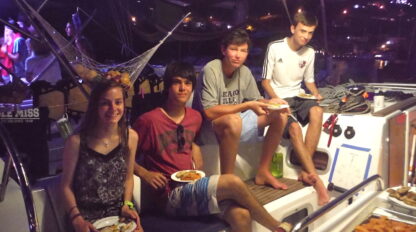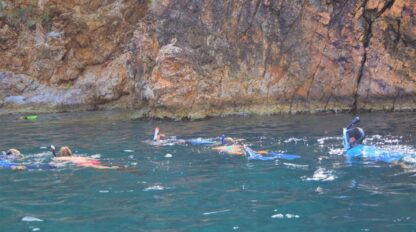Environmental Awareness: The Lionfish

The Lionfish – also known as the zebrafish, firefish, turkeyfish, ornate butterfly-cod, or peacock lionfish depending on what part of the world you are in. You may have seen these exotic creatures in aquarium exhibits or perhaps you’ve even had the opportunity to witness them in the wild. There is no doubt that they are lovely and graceful animals. However, these impressive beauties have a serious dark side worth knowing about.
Background
Lionfish are native to the South Pacific and Indian Oceans – that’s a huge area between western Australia and Malaysia, east to French Polynesia, and all the way north up to the southern part of Japan! They can be recognized easily by their distinctive bands of maroon or brown and white coloration, as well as by their fan-like pectoral fins (fins on the side of the body) and long dorsal (on top) spines. Babies may be adorably small at just 1 inch long, but adults can grow up to 18 inches in size! Lionfish are slow and easy to see, so to avoid predators they hunt mainly at night and rely on their odd coloration and venomous spines to discourage other animals from trying to eat them. During the day they typically hide in the shadows of ledges or small caves in the coral. Lionfish are pretty territorial and typically go back to the same place repeatedly, but they aren’t picky about where that place is. They live anywhere from 1 to 1000 feet on hard bottom, coral reefs, in mangrove roots, seagrass beds, and artificial reefs.
Caribbean Troublemakers
Not too long ago, (around 2005) lionfish began showing up in the Caribbean after being introduced into the Atlantic in the early 1990’s. The population has grown disturbingly fast. But why does it matter? They are just another pretty tropical fish, right? Not exactly, it turns out.
Lionfish are voracious predators, meaning they love to eat and they’re extremely good at it. Lionfish have been observed eating prey two-thirds their own size. To put it in perspective, that would be similar to a grown male lion swallowing a grown cheetah whole. Usually, though, lionfish seek out smaller prey and eat lots of them. One lionfish was seen eating 20 small wrasses in only 30 minutes!
In their native habitat, lionfish have some predators including other lionfish, moray eels, bluespotted cornetfish, and several species of groupers. A few others like large triggerfish have learned how to break off the venomous spines so they can safely attack the lionfish. The problem arises because Caribbean reef predators are not used to such strange-looking food and have not yet developed a taste for lionfish. This allows lionfish in the Caribbean to eat without fear, often even hunting during the day. They live happy, healthy lives with no natural predators to keep their numbers in check.
Sail Caribbean Joins Conservation Efforts
On our summer teen adventure programs, students have the opportunity to learn about the tropical ecosystem of the beautiful British Virgin Islands. Our students help keep a lookout for lionfish and report any sightings. During scuba dives, teens have the option to carry weighted flags to mark where they spotted the lionfish so that Sail Caribbean Divers staff can return to the sight to remove the invasive fish. Students attending our summer marine biology camps actually get to dissect lionfish specimens to gain an even greater understanding of these beautiful but dangerously invasive animals.
If you ever find yourself face to face with a lionfish, be careful not to touch it and avoid the venomous spines. But if you have a way to safely catch it, look up some recipes – they’re completely safe to eat and taste delicious!
Join Sail Caribbean this summer and be a part of the effort to reduce lionfish populations in the British Virgin Islands!


